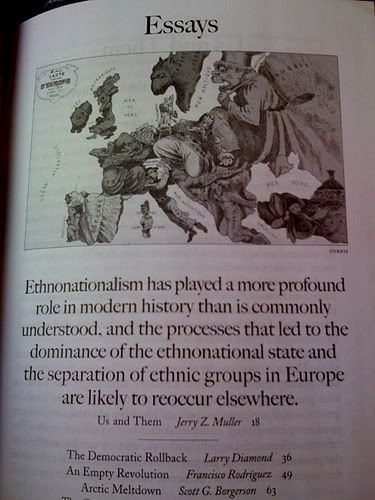By: inoljt, http://mypolitikal.com/
In 1996 scholar Samuel P. Huntington wrote a famous book titled “The Clash of Civilizations.” Huntington postulated that after the Cold War:
In this new world, local politics is the politics of ethnicity; global politics is the politics of civilizations. The rivalry of the superpowers is replaced by the clash of civilizations. In this new world the most pervasive, important, and dangerous conflicts will not be between social classes, rich and poor, or other economically defined groups, but between peoples belonging to different cultural entities. Tribal wars and ethnic conflicts will occur within civilizations.
I recently had the pleasure of reading through much of Huntington’s book. Huntington posits that the West will be challenged by two civilizations: the “Islamic civilization” and the “Sinic civilization.”
More below.
The book was written more than a decade ago (and the Foreign Affairs article which led to the book almost two decades ago). Despite this, the book has withstood extremely well the test of time. Much of Huntington said in 1996 could be duplicated without changing a single word today.
This is especially true with regards to what Huntington writes with regards to the “Islamic civilization”. Huntington wrote his book before the September 11 attacks. His thoughts about the Islamic-Western conflict are thus very prophetic. Many have criticized the “Islamic civilization” in similar ways that Huntington does in his book. However, most of these criticisms were written after 9/11. Huntington wrote that the West would clash with Islam before 9/11. He got it absolutely right.
(One minor critique: the West does work with Islamists. See: Libya, Syria.)
Huntington’s words with regards to the “Sinic civilization” have also withstood the test of time. Indeed, one could make the exact same analysis today as Huntington did more than a decade ago with regards to relations between the West and the “Sinic civilization.” It’s amazing how the East Asian situation today is exactly the same as the East Asian situation circa 1996.
There is one thing which Huntington gets badly wrong, however. And he gets it wrong in two distinct ways. This is Japan.
Firstly, Huntington classifies Japan as a separate civilization from the rest of East Asia. But there is just as much difference between China and South Korea as there is between China and Japan. Why, then, isn’t there a “Korean civilization” according to Huntington’s scheme? Or why not a “Vietnamese civilization” or “Xinjiang civilization”? There really is no good reason for this. The only difference, in fact, between Japan and the other parts of the “Sinic civilization” is that Japan successfully adapted to the West a century before the rest of East Asia the world.
In reality Japan is part of the “Sinic civilization.” See this graphic if you don’t believe me.
Of course, putting Japan and the rest of East Asia in one civilization really screws up Huntington’s analysis.
Secondly, Huntington spends a lot of time describing the economic tensions between Japan and the United States during the early 1990s. He does this because it fits well with his theory of clashing civilizations. Japan and the United States are doomed to clash because they belong to different civilizations.
Unfortunately, this is one part of the book that failed to withstand the test of time. Today relations between Japan and the United States are better than ever. After the collapse of the Japanese bubble, economic conflict (indeed, any conflict at all) between the two “civilizations” has essentially disappeared.
All in all, reading Huntington definitely makes you think. While I’m not particularly a fan of Huntington’s tone, he definitely is an articulate and intelligent writer.

2 comments